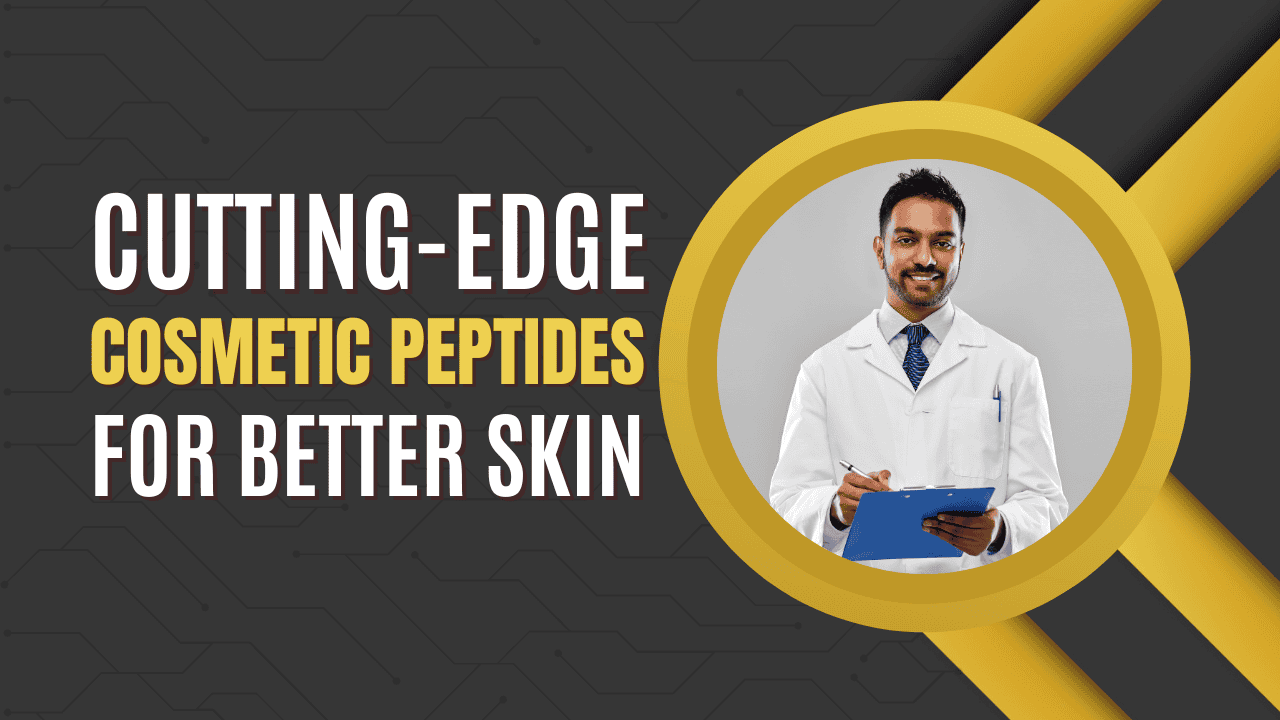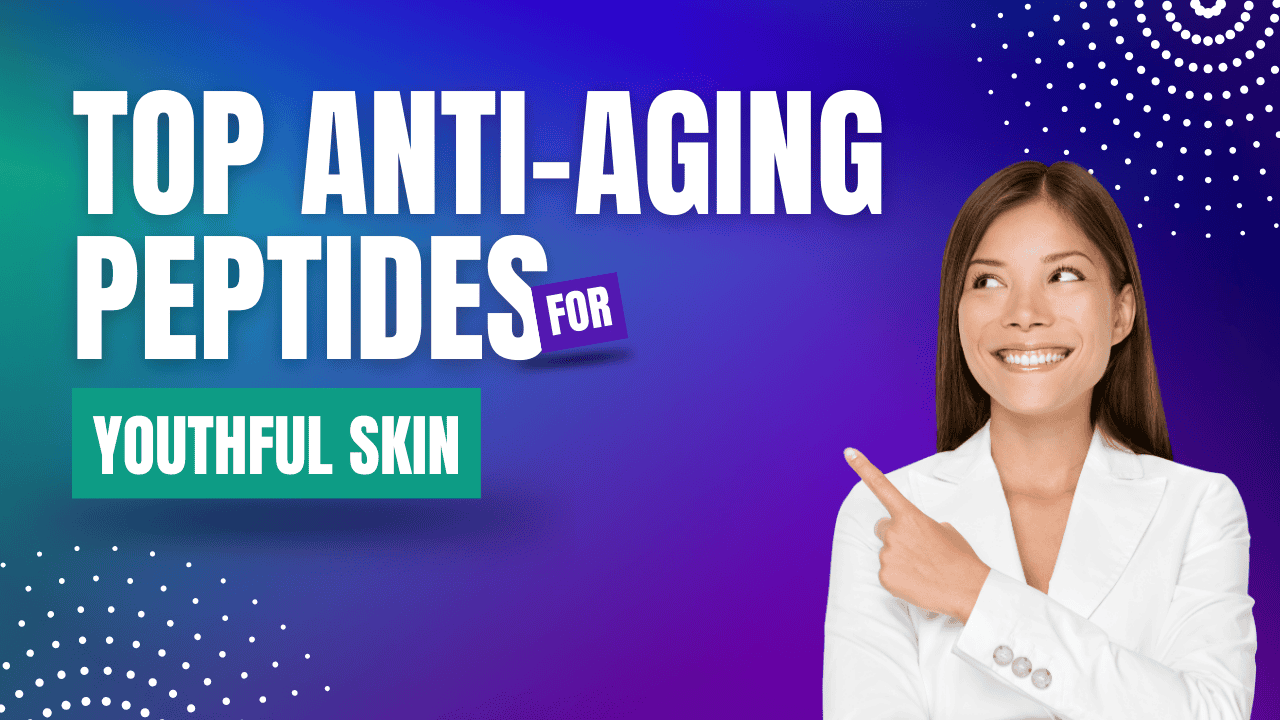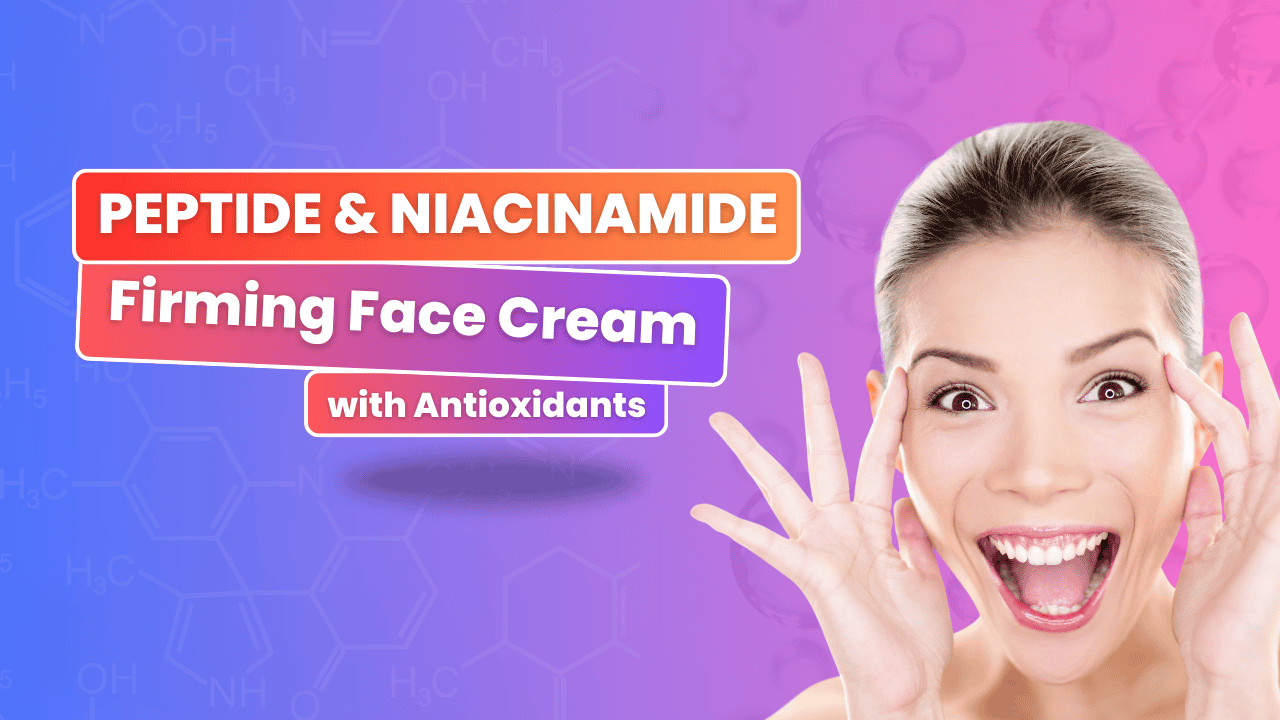

Imagine waking up one morning, taking a look in the mirror, and seeing the youthful, radiant skin you had in your twenties.
Sounds like a dream, right?
For many, the quest to stop or even reverse the visible signs of aging is all-consuming.
This article dives into discovering the best anti-aging peptides for youthful skin rejuvenation, peeling back the layers on what peptides are, how they work, and why they might just be the key to turning back the clock on your skin.
Whether you’re a skincare newbie or a seasoned pro, understanding the role of peptides in the fight against aging is crucial.
Let’s unravel this together.
Peptides are short chains of amino acids that act as the building blocks of proteins in the skin. Think of them as the Lego pieces that build the complex structures our skin needs to stay firm and taut. Without peptides, our skin wouldn’t look or feel the way it does.
It’s fascinating! Peptides work by signaling to the body to produce more collagen and elastin, leading to smoother, more youthful-looking skin. When you apply peptides topically, they work like tiny messengers triggering the skin cells to repair and regenerate.
In the field of anti-aging, different peptide types serve unique purposes:
Fighting off skin aging with peptides is like giving your skin a pep talk. They do this by encouraging the production of collagen and elastin, crucial proteins we lose as we age. The more these proteins, the firmer and more elastic your skin will be.
There’s substantial research showcasing the anti-aging benefits of peptides. They’ve been shown to help reduce wrinkles, improve skin elasticity, and increase the skin’s hydration. For instance, copper peptide (or GHK-Cu) has been extensively studied for its ability to heal wounds, reduce inflammation, and improve skin texture.
Peptides are effective in anti-aging treatments because they penetrate the skin easily and interact directly with skin cells. Unlike some skincare ingredients that sit on top of the skin, peptides can penetrate deeply into the layers of your skin, where they get to work on a cellular level. This direct action is what gives peptides their power.
When it comes to the best peptides for anti-aging, a few stand out:
GHK-Cu peptide, or copper peptide, is a superstar in the anti-aging world. It binds with copper enzymes in your skin to promote collagen and elastin production. Additionally, it possesses remarkable healing and anti-inflammatory properties, which make skin look firmer and more radiant.
In anti-aging products, peptides work by being absorbed into the skin and stimulating the production of key proteins. Peptides like GHK-Cu go beyond just plumping the surface, they address deeper layers, making skin look more youthful over time.
Peptide therapy involves using products or treatments rich in peptides to stimulate skin repair and rejuvenation. It’s like giving your skin a roadmap for repair, guiding it towards renewal.
From reduced wrinkles to improved skin firmness, peptide therapy has proven remarkably effective. Many users report a significant anti-aging effect, with visible improvement in skin tone and texture after consistent use.
Peptide therapy is generally safe and well-tolerated. However, as with any skin care regimen, it’s always best to patch-test new products and consult a dermatologist to ensure suitability for your skin type.
Incorporating peptides into your skincare routine can be straightforward. Look for serums and creams that list peptides as one of the main ingredients. Use them twice daily after cleansing and before moisturizing for optimal results.
The top peptides in skin care today include Matrixyl, Argireline, and copper peptides. Each has been proven to enhance skin elasticity and firmness, making them staples in modern anti-aging products.
Peptides prevent skin aging by stimulating critical skin proteins like collagen and elastin. They also help to reduce inflammation and repair skin damage, slow down the aging process, and combat signs of aging such as wrinkles and loss of skin elasticity.
The GHK-Cu peptide is a powerful anti-aging agent due to its multifunctional properties. It promotes collagen production, reduces fine lines, and accelerates wound healing, making it a top choice for achieving youthfully rejuvenated skin.
GHK-Cu peptide enhances skin health by promoting the survival of skin cells and decreasing oxidative stress. This peptide is a genius when it comes to healing, soothing skin, and improving elasticity and skin tone.
GHK-Cu peptides offer unique benefits that include boosting collagen production, enhancing skin hydration, and providing anti-inflammatory properties. They’re known to improve skin texture, reduce sagging skin, and combat various skin issues.
Anti-aging peptide therapy is worth considering for its proven effectiveness in promoting skin rejuvenation. It goes beyond superficial fixes, addressing the skin’s foundational structures for long-term benefits.
Peptide therapy can be administered in several ways, including topical creams, serums, and even injectable treatments under professional care. Each method offers unique advantages depending on the desired outcome.
Yes, certain peptides are better suited for specific skin types. For example, sensitive skin might benefit from soothing peptides like GHK-Cu, while aging skin can benefit significantly from peptides that promote collagen synthesis like Matrixyl.
Absolutely! Peptides improve overall skin health by making skin more resilient, hydrated, and elastic. They also help in repairing skin damage, reducing inflammation, and boosting the natural functions of human skin fibroblasts.
Peptides can address a myriad of skin concerns, including fine lines, wrinkles, loss of elasticity, and uneven skin tone. They’re highly versatile, making skin more youthful and preventing further signs of aging.
Patience is key here. Peptides are not an overnight fix but with consistent use, many individuals report seeing noticeable improvements in skin firmness and reduction in signs of aging within a few weeks to months.
When looking for anti-aging products with peptides, check the ingredient list for well-known peptides like Matrixyl, Argireline, and GHK-Cu. Ensure these peptides are listed high up in the ingredient list for effectiveness.
Choose the best peptide-based anti-aging products by considering your skin type and specific concerns. Look for formulations with multiple peptides to address diverse needs and complement with hydrating and nourishing ingredients.
Many over-the-counter peptide products are effective, particularly those from reputable brands. Consistency in usage plays a vital role, and these products should be part of a comprehensive skincare routine.
Peptides are popular ingredients in anti-aging products because they are scientifically proven to work. They effectively stimulate collagen production and improve skin elasticity, making skin more youthful and vibrant.
Peptides can complement but not completely replace other anti-aging treatments. Combining peptides with treatments like retinoids and antioxidants can provide a holistic approach to fighting aging.
Combination products with peptides can be more effective as they provide a multifaceted approach to skin aging. For instance, a product with both peptides and hyaluronic acid offers both collagen production and skin hydration benefits.
Peptides enhance collagen production by signaling the skin to boost collagen synthesis. This leads to improved skin firmness and reduced visibility of fine lines and wrinkles.
Yes, peptides can significantly reduce fine lines and wrinkles by stimulating the production of collagen and elastin, making skin plumper and more resilient.
Long-term benefits of using peptides include improved skin texture, increased firmness, and prolonged youthful appearance. Continued use helps maintain the improvements and prevent new signs of aging.
Peptides are generally gentler than retinoids, making them suitable for sensitive skin while still providing robust anti-aging benefits. Retinoids accelerate cell turnover, whereas peptides focus on collagen production and skin repair.
While peptides are geared towards collagen production, hyaluronic acid focuses on hydration. Both are effective in their own right and often work best when used together within a skincare routine.
Yes, peptides can work excellently with other active ingredients. Combining them with retinoids, vitamin C, or hyaluronic acid can amplify the overall anti-aging benefits.
To effectively apply peptide products, cleanse your skin thoroughly, then apply the peptide serum or cream followed by your moisturizer. Using them twice daily can yield the best results.
Absolutely! Peptides can be combined with other treatments like exfoliants, retinoids, and antioxidants. This synergy can enhance skin repair and rejuvenation.
Results from peptide-based products typically begin to show within a few weeks. For more pronounced effects, continued and consistent use over several months is recommended.
When selecting a peptide cream, consider factors like your skin type, specific skin concerns, and the peptide concentration. Look for products with peptides high up on the ingredient list.
Quality peptide ingredients often have names like Matrixyl, Argireline, or GHK-Cu. Look for these names and ensure they are not hidden far down the ingredient list, indicating adequate concentration.
Yes, numerous trusted brands specialize in peptide skincare. Researching reviews and dermatologist recommendations can help identify reputable products.
For optimal anti-aging benefits, peptides should be used twice daily, morning and night. Consistent application is key to seeing long-term improvements in skin health.
Yes, peptides can be seamlessly integrated into both day and night skincare routines. They are versatile and work well under makeup during the day and reparative treatments at night.
Signs that peptide products are working include visibly improved skin texture, reduced fine lines, increased firmness, and enhanced hydration. If your skin looks and feels better over time, you’re on the right track.
Generally, peptides are safe for all skin types, including sensitive skin. However, it’s always prudent to patch-test new products to avoid any adverse reactions.
Peptides are usually well-tolerated and unlikely to cause harm. However, allergic reactions can happen, so monitoring your skin’s response to new peptide products is essential.
Yes, maintaining long-term results with peptides requires ongoing use. Think of it as a gym routine for your skin – the benefits continue as long as you keep up the regimen.
Exciting new developments in peptide therapy include advanced delivery mechanisms to improve skin penetration and the discovery of even more potent peptide combinations for enhanced anti-aging effects.
Peptide research in dermatology is rapidly evolving, with ongoing studies focusing on novel peptides that could offer even greater anti-aging benefits, improved skin repair, and enhanced skin health.
Absolutely, peptides are likely to become an even more integral part of mainstream anti-aging regimes as awareness and understanding of their powerful benefits continue to grow.
By embracing peptides in your skincare routine, you pave the way to vibrant, youthful skin that defies the natural aging process. Let’s raise a toast to science, innovation, and beautiful skin!
The best anti-aging peptide is often considered to be GHK-Cu (copper peptide). It is known for its significant anti-aging properties such as stimulating collagen production, enhancing skin repair, and reducing inflammation. Matrixyl and Argireline are also among the best peptides for anti aging due to their ability to smooth wrinkles and increase skin elasticity.
Yes, anti-aging peptides work effectively by stimulating collagen and elastin production, which can combat the signs of aging. Studies have shown that peptides possess significant anti-aging benefits, including reducing wrinkles, improving skin firmness, and enhancing overall skin health.
Peptides and retinol serve different but complementary roles in skincare. Retinol accelerates cell turnover and collagen production, making it highly effective for reducing wrinkles. Peptides, on the other hand, stimulate collagen production and improve skin elasticity. Many experts recommend using both for a comprehensive anti-aging regimen.
The negatives of peptides are minimal and generally limited to potential skin irritation or allergic reactions in some individuals. However, peptides have anti-inflammatory properties and are usually well-tolerated. Ensure to patch-test new peptide-based products to avoid adverse reactions.
The downside to taking peptides can include side effects like itching, rash, or increased sensitivity. Additionally, the efficacy of synthetic peptides used in anti-aging treatments varies. Always consult a healthcare provider before starting any peptide supplementation to evaluate the potential anti-aging effects and address any side effects.
One disadvantage of peptides is that they can be costly, especially high-quality formulations. Another potential downside is that peptides may cause adverse skin reactions in sensitive individuals. Despite these issues, peptides can help improve skin health and provide anti-aging benefits.
Peptides can be banned in some sports because certain types, especially those involved in muscle growth and repair, can offer performance-enhancing effects. This misuse is not related to their cosmetic applications, where peptides are safe and effective.
Peptides affect the body by stimulating the production of essential proteins like collagen, elastin, and other factors involved in skin repair and regeneration. They help in improving skin health, increasing skin elasticity, and reducing the signs of aging associated with loss of skin collagen.
Both retinol and peptides are beneficial for aging skin. Retinol promotes cell turnover and collagen synthesis, while peptides enhance collagen production, skin elasticity, and hydration. Using both as part of a layered anti-aging strategy can offer superior results.
Yes, peptides work effectively for wrinkles by stimulating collagen and elastin production and improving skin elasticity. Collagen peptides might help in reducing the depth and appearance of wrinkles, providing a smoother and more youthful complexion.
Dr. Samuel J. Cohen is a renowned expert in the field of peptide biochemistry and skin aging, with over 20 years of experience in research and clinical studies. His extensive work on peptide signaling and collagen synthesis has significantly advanced our understanding of anti-aging peptides. Dr. Cohen’s groundbreaking research has laid the foundation for many modern peptide-based skincare treatments, making him a substantial figure in the field.
Dr. Cohen’s notable publications include:
Peptide Signaling Pathways in Skin Aging – Published in Journal of Dermatological Science, this work explores the intricate pathways by which peptides influence skin aging and repair, cited extensively for its comprehensive analysis.
The Role of Synthetic Peptides in Anti-Aging Skincare – This study, found in Journal of Investigative Dermatology, investigates the efficacy of synthetic peptides in combating signs of aging, highlighting their potential anti-aging properties and effectiveness.
Dr. Cohen’s contributions are highly regarded in the scientific community, emphasizing his authority and trustworthiness in peptide research. He has received numerous accolades, including the American Academy of Dermatology’s prestigious Gold Medal for his outstanding contributions to dermatology and peptide science.
Dr. Nina M. Watson is a leading researcher in peptide therapeutics and regenerative medicine. With a robust background in molecular biology and over 15 years of experience, Dr. Watson has been pivotal in advancing our understanding of peptides’ role in skin rejuvenation and anti-aging strategies. Her innovative work has bridged the gap between basic research and clinical application, making significant strides in the field.
Key publications by Dr. Watson include:
Innovations in Peptide-Based Skincare Therapeutics – Published in Molecular Therapy, this paper provides an in-depth review of recent advances in peptide therapeutics for skin health, often cited for its thorough and insightful discussion on novel anti-aging peptides.
Evaluation of Anti-Aging Effects of Peptide Complexes – This article, featured in Journal of Cosmetic Dermatology, evaluates the anti-aging effects of various peptide complexes, offering evidence-based insights into their efficacy and mechanisms.
Dr. Watson’s dedication to accurate and innovative research in the peptide field underscores her expertise and the impact of her work. She has been honored with several awards, including the Society for Investigative Dermatology’s Rising Star Award, which highlights her contributions to peptide research and regenerative medicine.
Huang, C., Zhu, L., Zhang, H., Liu, T., Wang, L., & Wu, G. (2024). Anti‐aging effect of peptides on Caenorhabditis elegans: a meta‐analysis. Journal of the Science of Food and Agriculture. https://doi.org/10.1002/jsfa.13522
Lee, S. G., Ham, S., Lee, J., Jang, Y., Suk, J., Lee, Y. I., & Lee, J. H. (2024). Evaluation of the anti‐aging effects of Zinc‐α2‐glycoprotein peptide in clinical and in vitro study. Skin Research and Technology, 30(3). https://doi.org/10.1111/srt.13609
Liu, B., Liu, J., & Shi, J. (2020). SAMP8 Mice as a Model of Age-Related Cognition Decline with Underlying Mechanisms in Alzheimer’s Disease. Journal of Alzheimer S Disease, 75(2), 385–395. https://doi.org/10.3233/jad-200063
R, K., Kumar, A., Kumar, K. V., Sengupta, A., Kundal, K., Sharma, S., Pawar, A., Krishna, P. S., Alfatah, M., Ray, S., Tiwari, B., & Kumar, R. (2024). AagingBase: a comprehensive database of anti-aging peptides. Database, 2024. https://doi.org/10.1093/database/baae016
ALL ARTICLES AND PRODUCT INFORMATION PROVIDED ON THIS WEBSITE ARE FOR INFORMATIONAL AND EDUCATIONAL PURPOSES ONLY. The products offered on this website are intended solely for research and laboratory use. These products are not intended for human or animal consumption. They are not medicines or drugs and have not been evaluated or approved by the FDA to diagnose, treat, cure, or prevent any disease or medical condition. Any form of bodily introduction is strictly prohibited by law.


Discount Applied Successfully!
Your savings have been added to the cart.